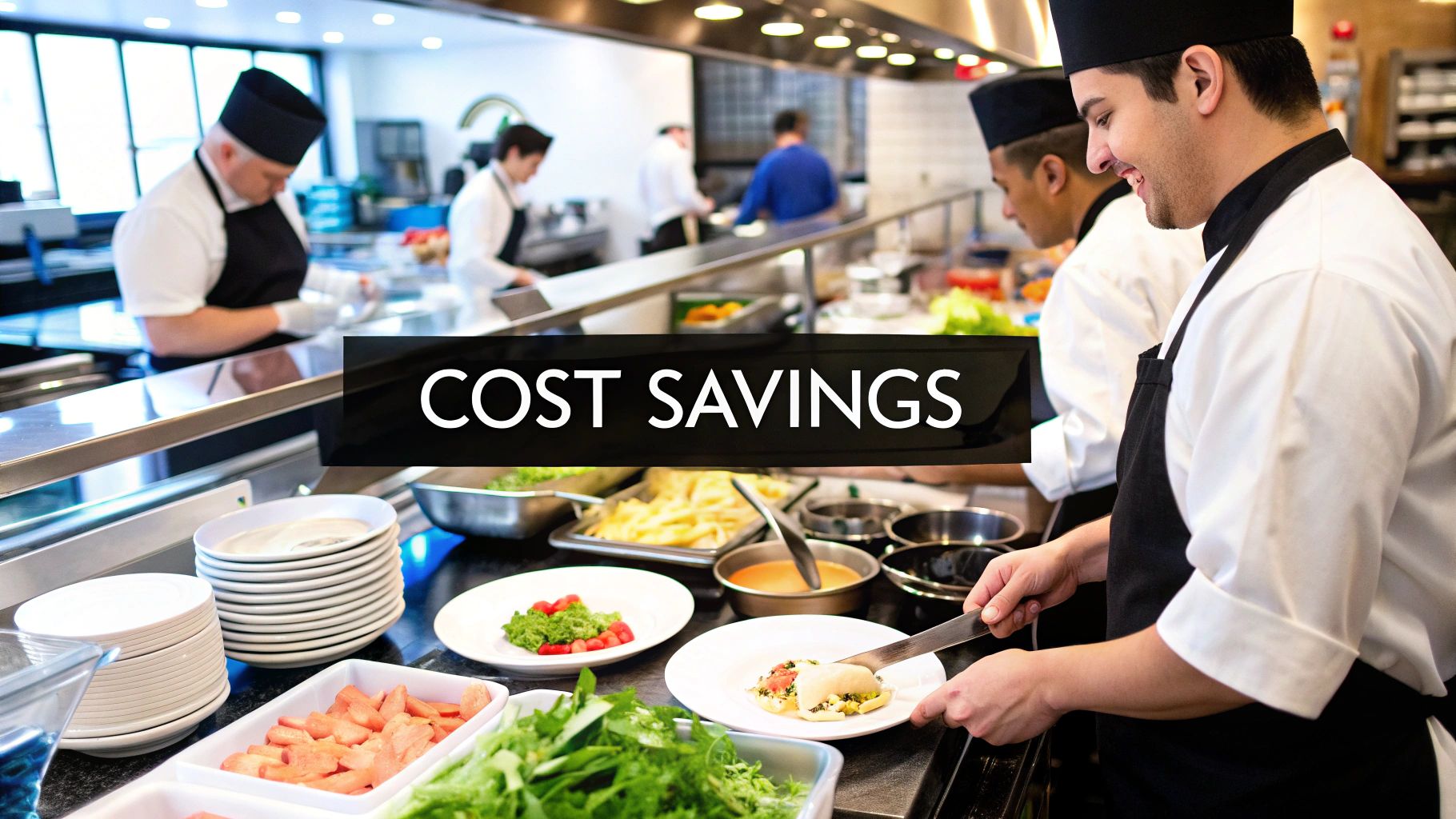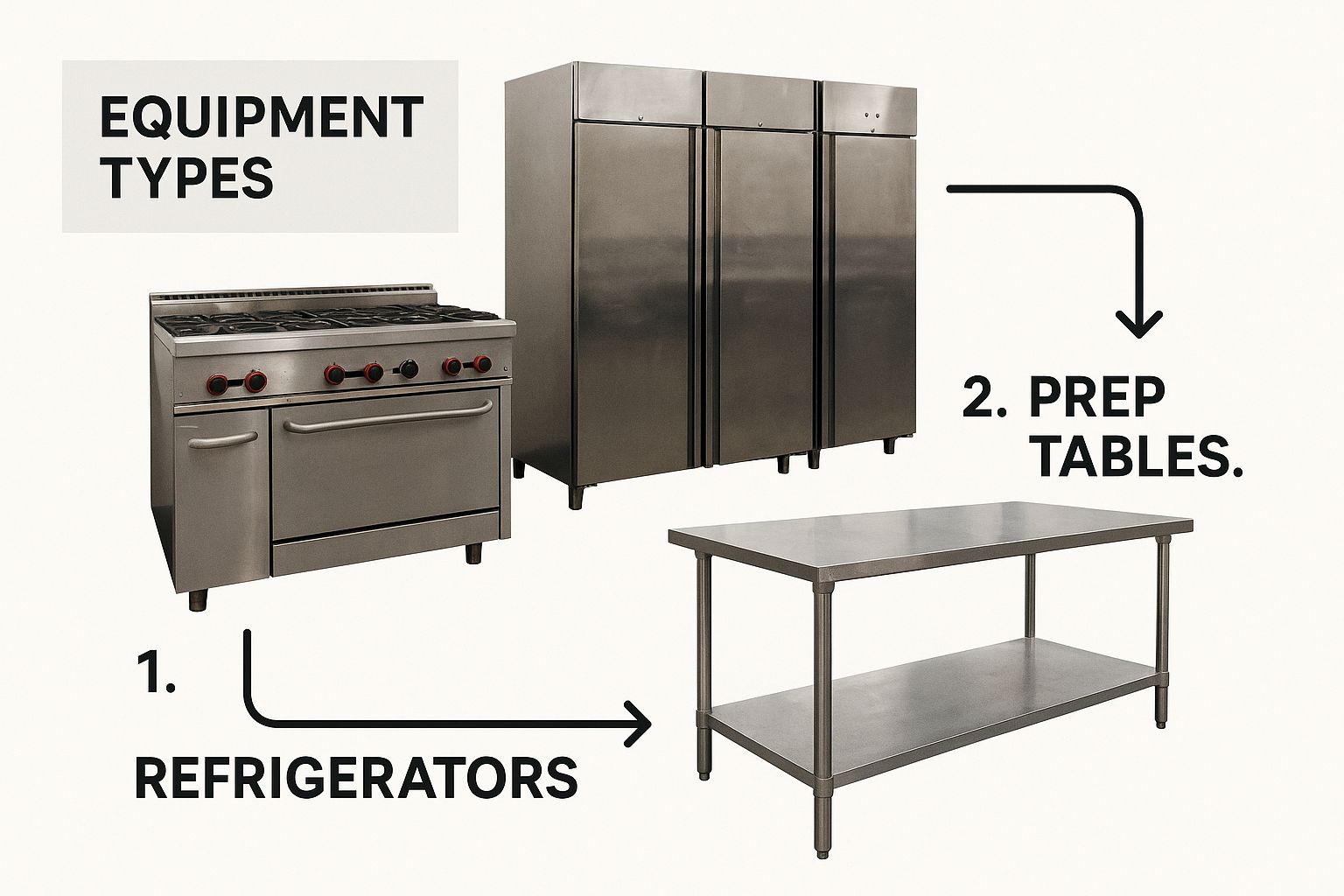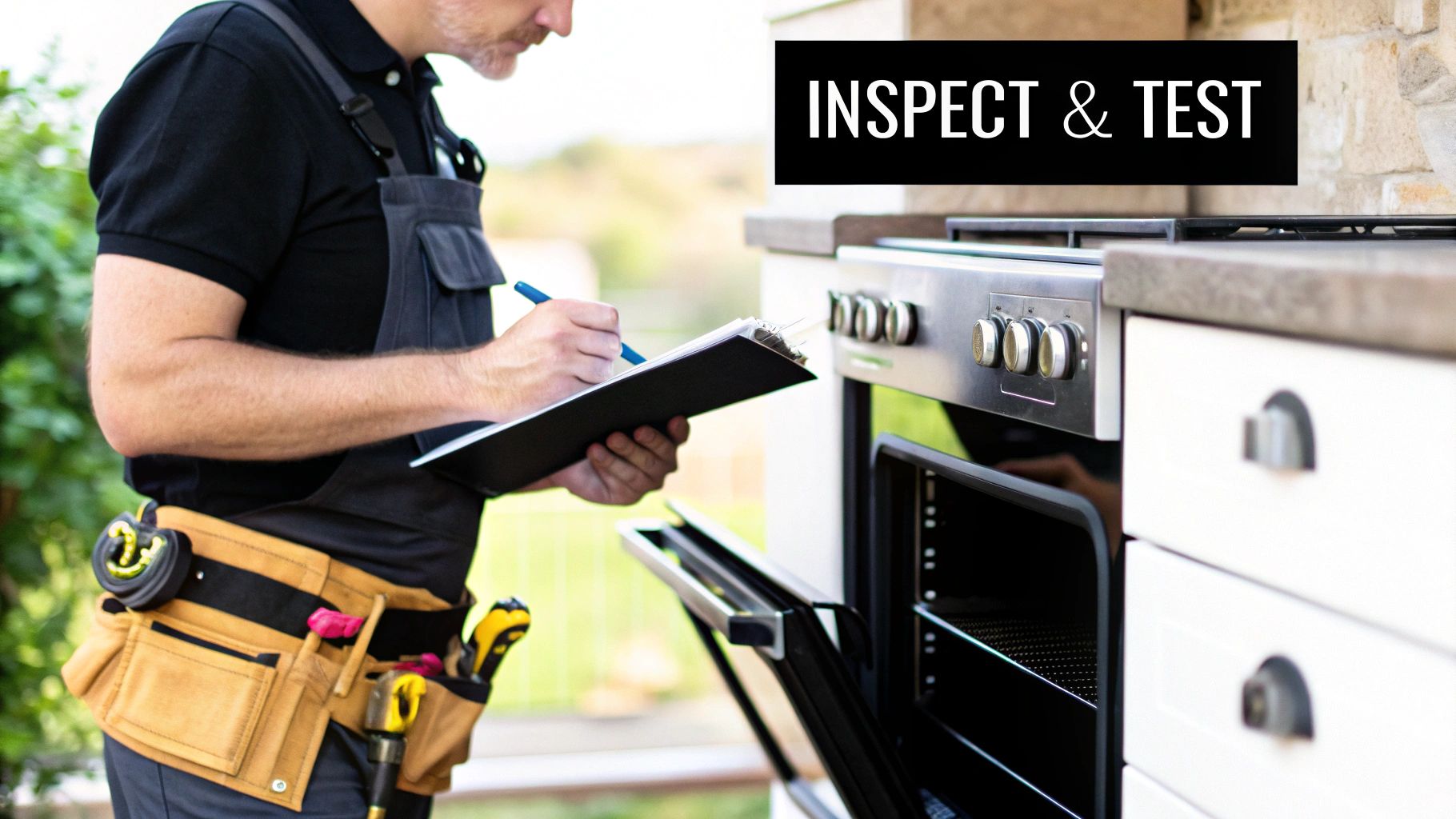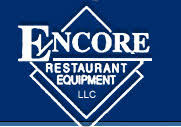
Used Restaurant Equipment Seattle: News, Deals & Insider Tips
Share
As a Seattle chef or restaurant owner, you know that your kitchen is the heart of your business—and one of the biggest line items on your budget. But here's a reality check from those of us who've been in the trenches: you don't need to buy everything brand new. In fact, tapping into Seattle’s market for used restaurant equipment isn't just a cost-saving measure; it's one of the smartest financial moves you can make to get your doors open and stay ahead of industry trends. This guide will help you discover the latest news, exclusive deals, and insights on restaurant equipment and supplies.
Why the Used Equipment Scene in Seattle is a Goldmine
Seattle's food scene is constantly evolving. It's a city of passionate chefs and ambitious owners, which means restaurants are always opening, closing, rebranding, or upgrading. This constant churn creates a fantastic, ever-refreshing pool of high-quality, pre-owned kitchen gear, offering exclusive deals for those in the know.
Think about it. A high-end spot in Belltown might shut its doors, suddenly making its nearly new commercial ranges and top-of-the-line refrigeration available. Or a beloved waffle house in West Seattle could decide to switch to catering, putting its specialized equipment up for grabs. This isn't junk—it's often battle-tested, professional-grade equipment.
The real secret is that you’re often buying equipment from successful restaurants that simply changed direction, not from businesses that failed because their gear was subpar. You’re getting reliable, chef-approved brands that still have years of service left in them.
A Market That’s Always Changing
The way Seattle eats has changed, too. The explosion of pop-ups, food trucks, and ghost kitchens has created a whole new demand for equipment that’s compact, efficient, and sometimes portable. You can learn more about how these industry trends are shaping the local scene from resources like Encore Seattle. This shift means the variety of used equipment available has never been better, no matter what kind of concept you're launching.
For anyone getting into the Seattle food scene, the advantages of buying used are too good to ignore. The table below breaks down the key benefits.
Key Benefits of Buying Used Equipment in Seattle
| Advantage | Impact for Your Restaurant |
|---|---|
| Drastic Cost Reduction | Expect to save 50-70% on major pieces. That's capital you can redirect to marketing, hiring great staff, or covering those first few months of rent. |
| Immediate Availability | New equipment can have frustratingly long lead times. Used gear from a local Sodo supplier is usually something you can pick up the same day. |
| Access to Premium Brands | This is your chance to get your hands on the workhorses of the industry—brands like Hobart, Vulcan, and True—that might be out of reach when buying new. |
Ultimately, understanding this local market isn't just about saving a few bucks. It's about building a professional-grade kitchen on a practical budget, giving your new restaurant a solid foundation for success right from the start.
Where to Find Seattle's Best Equipment Deals

Knowing where to look is half the battle when you're on the hunt for used restaurant equipment in Seattle. A simple Google search is a start, but the real gems and exclusive deals are often found through local channels that get first dibs when a restaurant closes or pivots.
These are the moments savvy buyers live for. For instance, when a beloved spot like Bebop Waffle Shop in West Seattle shifted its focus to become an event space, all of its specialized kitchen gear went up for grabs. The same thing happens when a long-standing establishment like the Alki Café closes its doors—suddenly, its entire kitchen inventory, from cooktops to coolers, hits the second-hand market.
Your Go-To Sourcing Channels
You can't just rely on one source. To find the right piece at the right price, you need to have a few different avenues you're exploring at all times.
- Local Dealers and Liquidators: Your first stop should be the established dealers, many of whom are clustered in the Sodo area. These pros inspect, clean, and sometimes even offer a limited warranty on their stock. Liquidators, on the other hand, handle entire restaurant closures and are a goldmine if you need to buy multiple pieces at once.
- Restaurant Auctions: Keep a close watch on local auction houses that deal in commercial assets. It can be a bit of a whirlwind, but if you’ve done your research on what equipment is actually worth, you can walk away with some unbelievable bargains.
- Online Marketplaces and Private Sales: Don't sleep on sites like Facebook Marketplace or Craigslist. This is where you'll find restaurants selling off their equipment directly to buyers. The catch? You have to be ready to move fast and inspect everything yourself, since these are almost always "as-is" deals.
The real secret is to build relationships. Get to know the sales reps at the local dealerships. They're the ones who get the first call when a restaurant is upgrading or closing down, and they can tip you off to high-quality inventory and exclusive deals before it even makes it to the showroom floor.
Before you even start your search, you absolutely need a clear picture of what your kitchen requires. To make sure you don’t miss a single essential item, take a look at our commercial kitchen equipment checklist.
The U.S. used restaurant equipment industry is filled with specialized distributors who carry a massive assortment from top-tier brands like Blodgett, Vulcan, and Hobart. You can find everything from fryers and grills to ice machines and commercial dishwashers. To get a sense of the broader market, you can explore the range of available equipment from national suppliers.
The On-Site Inspection: Your Most Important Step
Finding what looks like a great deal on a used piece of equipment is exciting, but that excitement can vanish pretty quickly if it breaks down mid-service. A cheap price tag is worthless if you're just buying someone else's headache. This is exactly why the on-site inspection is the most crucial part of buying used gear.
You've got to be more than just a casual observer. Think of yourself as a detective. Get your hands dirty, open the doors, turn the knobs, and look for the subtle signs of wear that could mean big repair bills down the road.
This is a great visual breakdown of the sheer variety of equipment you'll come across in the used market.

Seeing everything laid out like this really drives home why you need a specific game plan for each type of appliance, whether it's a walk-in cooler or a six-burner range.
Zeroing In On The Details
Every type of equipment has its own common failure points. I've learned this the hard way over the years. To make this easier, I've put together a quick reference table to guide you. It covers what I always look for on the most common pieces you'll find.
On-Site Inspection Quick Reference
| Equipment Type | Key Inspection Point | What to Ask the Seller |
|---|---|---|
| Refrigeration | Gaskets and seals. Use the "dollar bill test"—if you can easily pull a bill from the closed door, the seal is bad. | "When was the last time the compressor was serviced?" |
| Gas Range/Oven | Igniters and burners. Look for heavy corrosion or clogged ports. Test every single burner and oven pilot. | "Have any of the thermocouples or gas valves been replaced?" |
| Ice Machine | Interior cleanliness and scale buildup. Check the evaporator plate for mineral deposits or pitting. | "What kind of water filtration system was used with this machine?" |
| Dishwasher | Spray arms and heating elements. Ensure the arms spin freely and aren't clogged. | "How often was the machine de-limed?" |
This table isn't exhaustive, but it's a solid starting point that covers the biggest potential money pits for each category. Always ask if you can see the unit run!
My biggest piece of advice: Never, ever forget to check the utility connections. I once saw a chef get a fantastic deal on a high-capacity, three-phase convection oven, only to realize his kitchen was only wired for single-phase power. That "deal" became a very expensive electrical project. Always confirm the voltage, phase, and gas type against what your building can actually support.
Ask the Right Questions to Uncover the Real Story
What you ask is just as critical as what you see. A simple "Does it work?" isn't enough. You need to dig into the equipment's history.
Here are a few questions I always ask:
- "Can I see any maintenance logs or repair invoices?" A well-run kitchen usually has these. If they don't, it could be a warning sign.
- "So, why are you selling this piece?" Their reason tells a story. Are they upgrading? Closing down? Or is it because the unit was constantly breaking down?
- "What kind of volume did this unit handle?" A griddle from a busy 24/7 diner has lived a much harder life than one from a small lunch spot.
Knowing these details, alongside the physical layout and limitations of your own space, is everything. It's not just about buying a machine; it's about integrating it smoothly into your operation. For a deeper dive into making everything fit, our guide on commercial kitchen design and layout is a fantastic resource. A little prep work here will ensure your smart purchase works for you from day one.
Closing the Deal: Negotiation and Logistics
So, you've inspected the equipment and you're ready to make it yours. Now comes the part that can make or break a good deal: the negotiation. This isn't about throwing out a lowball offer just to see what sticks. In the Seattle restaurant community, a good reputation matters. The goal is a fair price that reflects the equipment's true condition.
Before you even start talking money, do your homework. Jump online and see what that specific model of oven or mixer is selling for elsewhere. Having a solid grasp of the market value gives you a realistic starting point and shows the seller you're serious.
The Art of the Fair Offer
Your inspection notes are your best friend here. Did you notice the refrigerator's gasket was looking a bit tired? Or that a knob on the range was loose? These aren't just minor flaws; they are bargaining chips.
You can bring these up respectfully. Try something like, "This is exactly what I'm looking for, but I did notice the seals will need to be replaced. I got a quote, and it’s about $150. Would you be willing to come down a bit to help cover that repair?" This approach is collaborative, not confrontational. It proves you've done your due diligence and you're planning for the real-world costs.
A successful negotiation isn't about winning; it's about both you and the seller walking away feeling like you got a square deal. Be polite, be firm, and know your walk-away price. If the numbers just don't make sense, it's okay to pass.
Getting It From Their Place to Yours
Once you've shaken hands on a price, the next challenge begins: getting that bulky, heavy piece of steel from their kitchen to yours. Don't ever treat logistics as an afterthought. This is where a great deal can quickly turn sour if you're not prepared.
Here's what you need to nail down before you pay:
- Bring in the Pros: Seriously, unless it's a countertop microwave, hire professional movers who specialize in commercial equipment. They have the proper dollies, lift gates, and experience to move a 600-pound range without wrecking it, your back, or the seller’s doorway. It's a non-negotiable budget item.
- Measure Everything. Twice: I can't stress this enough. Before the movers even think about showing up, get out your tape measure. Will that beautiful walk-in cooler actually fit through your restaurant's back door? Does your electrical panel have the right voltage and phase for that three-phase convection oven? Confirming these details upfront saves you from a world of expensive headaches.
- Plan for Installation: Some equipment is plug-and-play. Other pieces, especially gas lines or complex refrigeration systems, absolutely require a certified technician for installation. You need this done right to meet health codes and to make sure your warranty (if any) isn't voided from day one.
Thinking through these logistical steps is just as important as the initial inspection. By planning for the costs and complexities of moving and installation, you ensure your savvy find in the Seattle used equipment market remains a genuine win for your business.
Why Smart Seattle Restaurateurs are Buying Used Equipment

Let's be clear: choosing used restaurant equipment for your Seattle spot isn't just about saving a few bucks. It's one of the smartest strategic decisions you can make, putting your business on solid ground from the get-go. By staying informed about industry trends, you're not just buying a piece of steel; you're buying into a thriving market that offers incredible value.
The demand for reliable, pre-owned gear is exploding. Think about it. With everything from ghost kitchens and pop-ups to niche coffee shops opening up, everyone needs quality equipment without the brand-new price tag. This isn't about settling for less. It’s about being resourceful.
More Than Just a Good Deal
Beyond the obvious financial perks, buying used is a genuinely sustainable move. When you give a high-quality stainless steel range or mixer a second life, you're cutting down on manufacturing waste and reducing your carbon footprint. In an eco-aware city like Seattle, that’s a story worth telling your customers.
Buying quality used equipment shows you understand what really matters for the long haul. You're not just saving money today; you're building a kitchen with workhorse pieces that have already proven they can handle the heat of a professional environment.
And the market data backs this up. The global used restaurant equipment market was valued at around USD 6.66 billion in 2023. Projections show it’s on track to nearly double to USD 13.36 billion by 2033.
That’s a solid compound annual growth rate of 7.2%. This isn't some fleeting trend; it’s a stable, growing market. You can see the market projections for yourself to understand the full picture.
Ultimately, opting for used equipment is an informed business choice. It proves you're building your kitchen on a foundation of reliability, sustainability, and pure financial savvy.
Common Questions from Seattle Restaurant Owners
If you're outfitting a restaurant in Seattle, you probably have a lot of questions about buying used equipment. It’s a smart way to save money, but it comes with its own set of challenges. We get these questions all the time from local chefs and owners, so let's clear up the most common ones.
Dealer or Private Seller?
This really comes down to your comfort level with risk. Going through a professional dealer, like many of the established spots in the Sodo area, usually means you're getting equipment that's been tested and cleaned. Some will even offer a short-term warranty, which can be a lifesaver. You’ll pay a premium for that security, but for many, it’s worth it.
On the other hand, you can find incredible deals from private sellers, often from restaurants that are closing down on places like Facebook Marketplace. These are almost always “as-is” sales, which means if it breaks the day after you buy it, it's your problem. No matter which path you take, you absolutely have to inspect the gear yourself, hands-on. It's a deal-breaker.
What Are the Biggest Mistakes to Avoid?
Honestly, the costliest mistakes we see are usually the simplest to avoid. The biggest one? Buying something sight unseen. Never, ever do that. Right behind that is failing to measure your own space before you go shopping. It’s heartbreaking to watch someone try to fit a beautiful six-burner range through a doorway that's two inches too narrow.
Another classic blunder is forgetting to check the utility hookups. You have to confirm the exact voltage, gas type, and electrical phase. Bringing a three-phase oven back to a kitchen wired for single-phase is a nightmare for your timeline and your budget.
Can I Finance Used Equipment?
Absolutely. Financing used equipment is not only possible, it's often a very savvy move for managing cash flow. Plenty of lenders specialize in business loans for used gear, especially if you're buying from a dealer who can provide clear documentation for the piece.
Getting approved will depend on your business credit and financial history. My advice? Get pre-approved for your loan before you even start looking at equipment. It sets a realistic budget from the get-go and signals to sellers that you're serious and ready to buy. This is especially helpful when you're setting up specific stations; our guide on sourcing commercial bar equipment has more detailed tips on that front.
At Encore Seattle Restaurant Equipment, we're here to help you find the right equipment at the right price, with financing options to make it happen. We are your source for the latest news and exclusive deals on restaurant equipment and supplies. Visit us to explore our inventory and get expert advice for your Seattle restaurant.
